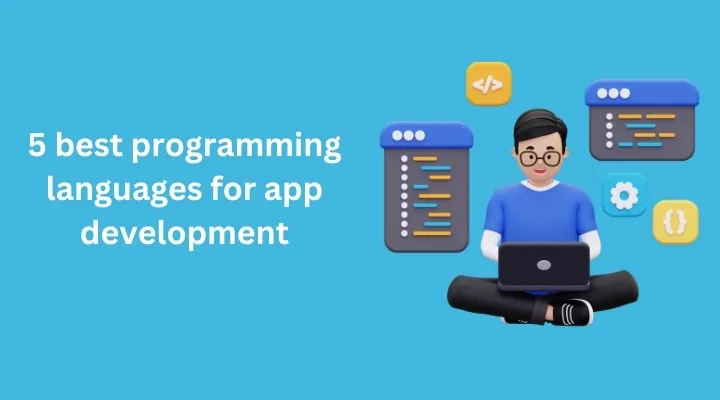5 best programming languages for app development in 2023

If you’re embarking on a thrilling app development journey in 2023? Whether you're an experienced coder or just taking your first steps into the world of programming, choosing the right programming language is a critical decision. This decision isn't just about picking a language; it's about setting the course for your project's success, determining its development speed, and ensuring its scalability.
Staying in sync with the latest programming languages is vital for today’s tech landscape. This article is your trusted companion, ready to explore the top five programming languages for app development in 2023. We'll uncover their strengths, unravel their quirks, and take you on a tour of their real-world applications within India's thriving app development community.
React: Unleashing the Power of Component-Based Architecture
React, often affectionately referred to as React.js or ReactJS, is a JavaScript library designed for crafting user interface components. Its trump card is the Virtual DOM, a feature that boosts application performance by a jaw-dropping factor. In fact, Airbnb, a household name, documented on its engineering blog that "The adoption of React yielded as much as a 10X increase in rendering performance."
Why Opt for React in App Development
Component-Based Architecture: React's component-based approach simplifies the creation, testing, and scaling of apps, thanks to reusable code modules.
Virtual DOM Magic: By eliminating the need to wrestle with the direct DOM, the Virtual DOM turbocharges updates and supercharges performance.
Thriving Ecosystem: React boasts a vibrant ecosystem teeming with libraries and tools, including Redux for state management and React Native for conquering the realm of mobile app development.
Flipkart, a juggernaut in India's e-commerce landscape, relies on React to deliver a seamless and interactive shopping experience to its customers.
Flutter: Google's Multifaceted Marvel
Flutter, Google's gift to developers, is an open-source UI software development toolkit - that empowers developers to craft natively compiled apps for mobile, web, and desktop platforms, all from a single codebase. Flutter's meteoric rise in popularity can be attributed to its efficiency and knack for providing a native-like user experience. Alibaba's Xianyu app, fueled by Flutter, slashed code development time by thirty percent and saw an astonishing eighty percent increase in shared code.
Why Embrace Flutter in App Development
Unified Codebase: Flutter lets you craft one codebase that effortlessly spans both Android and iOS, slashing development time and cost.
Turbocharged Development: Flutter's hot reload feature accelerates the development process, facilitating real-time code changes and expediting debugging.
Versatile Widgets: Flutter spoils developers with a treasure trove of customizable widgets, making it a breeze to create stunning and interactive user interfaces.
By leveraging Flutter, Dream11, India's premier fantasy sports platform developers crafted a single codebase that flexibly caters to both Android and iOS, putting an end to the headache of maintaining separate codebases and resulting in a twenty percent reduction in development costs.
PWA (Progressive Web Apps): The Best of Both Worlds
Progressive Web Apps (PWAs) are the harmonious union of web and mobile applications, offering users a native app-like experience while remaining accessible via web browsers. PWAs are swiftly gaining ground, bridging the gap between traditional websites and mobile apps. What's more, they possess the potential to be exceptionally data-efficient, with Flipkart Lite, a prominent PWA, consuming a mere one-third of the data compared to its native app counterpart.
Why PWA Deserves a Place in Your App Development Toolkit
Platform-Agnostic Appeal: PWAs gracefully waltz across diverse devices and platforms, making them an exquisite choice for casting a wide net.
Offline Prowess: PWAs are well-versed in the art of functioning offline or in areas with spotty internet connectivity, ensuring uninterrupted user experiences.
Budget-Friendly Development: Creating a PWA is often a more cost-effective venture compared to the resource-intensive task of building separate native apps for each platform.
BookMyShow, India's reigning champion of online ticketing, embraced the PWA revolution to enhance the mobile user experience. The result? Increased engagement and conversion rates speak volumes about the potential of PWAs.
Kotlin: Streamlining Android App Development
Kotlin, the brainchild of JetBrains and wholeheartedly endorsed by Google, represents a more concise, expressive, and secure alternative to the venerable Java. For Android app developers, migrating to Kotlin has become a logical choice, thanks to its modern features and seamless interoperability with Java.
Why Kotlin Is Your Companion in App Development
Brevity Rules: Kotlin demands fewer lines of code compared to Java, rendering your codebase cleaner and more manageable.
Interoperability Marvel: Kotlin effortlessly slots into your existing Java projects, reducing migration headaches to a mere whisper.
Enhanced Reliability: Kotlin's type system takes the edge off null pointer exceptions and other commonplace coding gremlins.
Zomato, a heavyweight in India's food delivery app arena, made the leap to Kotlin for its Android app, resulting in enhanced code quality and expedited development processes.
Swift: The Ace Up Your Sleeve in iOS Development
If your sights are set on conquering the iOS realm, Swift is the language you should befriend. Crafted by the brilliant minds at Apple, Swift is tailor-made for performance and security. Its claim to fame? A crystal-clear syntax and an expansive standard library. With each iteration, Swift becomes mightier and more approachable for developers.
Why Swift Is Your Ticket to App Development Excellence
Performance Prowess: Swift's performance rivals that of Objective-C, making it the darling of resource-intensive applications.
Guardian of Security: Swift's syntax and feature set serve as sentinels against common programming pitfalls, fortifying application stability.
Beginner-Friendly: Swift's lucid and intuitive syntax beckons to developers, both seasoned and green.
The choice of programming language for your app development odyssey is no trifling matter. It's a decision that demands careful consideration of your project's unique demands, your team's expertise, and the platforms you aim to conquer. By weighing these factors thoughtfully, you'll be poised to make an informed choice and embark on a journey of crafting innovative and triumphant apps in 2023 and beyond.